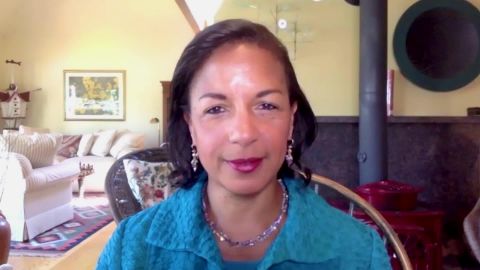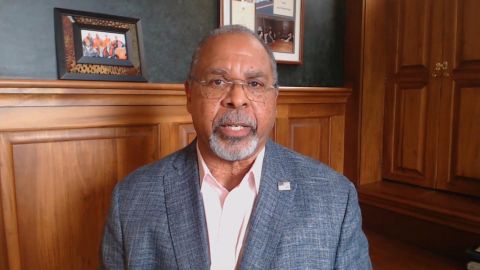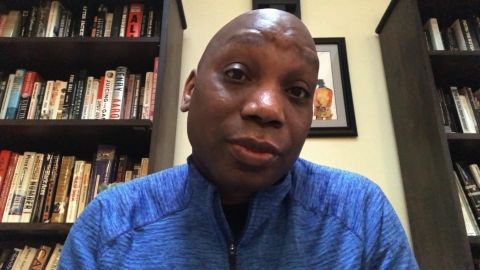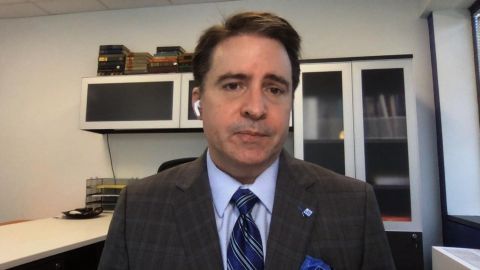Read Transcript EXPAND
CHRISTIANE AMANPOUR: Now, almost unnoticed in the current moment, a damning bipartisan Senate intelligence report which details Russia’s interference in the 2016 presidential election. And our next guest says that it’s happening again. Susan Rice was national security adviser to President Obama and ambassador to the United Nations. She tells our Walter Isaacson that this administration’s acceptance of Russian interference is hugely concerning and will add to the political divisions that we’re seeing right now.
(BEGIN VIDEOTAPE)
WALTER ISAACSON: Thanks, Christiane. And, Ambassador Susan Rice, welcome to the show.
SUSAN RICE, FORMER U.S. NATIONAL SECURITY ADVISER: Great to be with you, Walter.
ISAACSON: The Senate Intelligence Committee has just produced a bipartisan report, somewhat surprisingly. They have all agreed, whether it be Senator Burr and the Democrats, on Russian interference in the election 3.5 years ago. Do you think that report vindicates your view and those of others that the Russians intentionally meddled in our election, and that Trump welcomed it?
RICE: There’s no doubt. And no serious person who’s looked at this issue, from the various elements of our intelligence community, to now that the Senate and, of course, Mueller, could conclude otherwise. There’s still no doubt, even today, among Trump’s sitting senior officials that the Russians interfered in 2016 in our election, with the aim of advantaging Donald Trump. And Donald Trump, we now know, both from the Mueller report, but in more detail in many ways from this new Republican-led Senate report, welcomed, encouraged and benefited from that Russian assistance.
ISAACSON: And do you think the Russians are going to be trying to do it again? And are you — what are you particularly worried about?
RICE: Well, absolutely they’re going to do it again, and they already are. And our intelligence community a couple of weeks ago put out an updated warning, making it very clear that Russia is going to continue the similar tactics to what they employed in 2016, and, Walter, actually never stopped doing in the years since. So, not only might they again try to intrude into our electoral systems and our databases and our voter registration rules at the state level, but we also have to expect that they will continue to do what they have been doing, which is to pit Americans against each other, particularly on social media, exacerbating our divisions, whether on race or immigration or guns or gay rights, and trying to cause Americans to doubt each other, hate each other, and question the viability of our democratic institutions and the credibility of our vote. We also need to be concerned that Russia yet again, it will be working to advantage Donald Trump, this time with Trump in power, having said very clearly that he welcomes that assistance, that he would never turn away a foreign offer of support. And, indeed, he solicited that from Ukraine. He solicited it from the back lawn of the White House from China in broad daylight. And this is his modus operandi. And, in the case of Russia, we saw, from what we now learned in 2016, that there was active communication, coordination between elements associated with Russian intelligence and the Trump family and the Trump campaign. So, this is very worrisome. And now, in 2020, there’s an added element. And that added element, Walter, is that there are now members of the United States Senate on the Republican side, people like Senator Ron Johnson, who are running sham investigations, in quotations, taking information provided them by Russian operatives and Russian-backed Ukrainian officials who are trying to discredit, falsely, Joe Biden to advantage Donald Trump. So it’s not just now the Russians and the Trump campaign. It’s also, in some instances, allies in the Senate.
ISAACSON: What did you think when you watched the video of Jacob Blake, the latest African-American to be shot by police, after we have seen all the videos this year?
RICE: I just felt despair and despondency and anger and just amazement. He was walking with his back to the police to get in his own car with his three kids. And he was grabbed and shot repeatedly in the back. Why? Why? It’s so horrific. And it just happens all too often. And you would think that, after all that transpired following George Floyd’s murder, that some cop in a neighboring state might think twice before he pops off in broad daylight on somebody who posed absolutely no threat. But he doesn’t. And so that tells you just how profoundly problematic our society is and how policing in this country still bears little, if any regard for black lives.
ISAACSON: What do you think should be done about this? And do you worry that a slogan like defund the police might distract from what really needs to be done?
RICE: Yes. What needs to be done, at a minimum, is for the Senate to pass the George Floyd Justice in Policing Act, which was passed early and broadly by the House of Representatives. And it has languished in the Senate, because Mitch McConnell, as is so often the case, doesn’t want to do the right thing. And Donald Trump has absolutely no interest in seeing legislation that is fair, that is rational, that is balanced passed. But, obviously, that’s a step that is necessary, but it’s not sufficient. I do not favor defunding the police, if defunding the police means cutting all resources to police departments or dramatically slashing budgets. I think we cannot have a one-size-fits-all approach to this. There’s some communities where policing is underfunded. There’s some communities where it’s overfunded. There’s some communities where a rational reallocation of the resources that are earmarked for police would make great sense. I think we can reimagine the role of policing. I think we need to get police out of doing social work. I think we need to invest more in our communities and get at many of the underlying disparities that are causing so much suffering on a daily basis, from housing, to education, to health issues. I think all of that’s the case, but this slogan of so-called defunding the police is very predictably being hijacked by opponents of any sort of progress on racial justice as a way of dividing the majority of Americans who believe that it is long past time that there be more fairness and justice in our criminal justice system, but also in our society writ large.
ISAACSON: You talk about those political divisions in your book, and you say that they are a national security issue. Explain why.
RICE: Our divisions are preventing us from getting basic necessary things done. So we can’t fix the problems with the postal service or deal with our infrastructure or pass important legislation like the justice and policing act because, you know, Mitch McConnell and, and, uh, and Donald Trump will resist finding common ground. And there are areas where, you know, Democrats may need to compromise and, and they haven’t. Our divisions are preventing us from doing very fundamental things that are necessary for us to be effective, to be strong, uh, and to, uh, compete internationally. So that’s the first way in which our divisions are crippling us in a very fundamental way, and we can’t be strong and effective on the global stage when we are so debilitated domestically. But the second way that they are vulnerability is what we were discussing with respect to Russia, where adversaries like Russia, or especially Russia, recognize that they can weaken us as a rival on the global stage. They can discredit democracy, which is something that they have every interest in doing without ever firing a bullet, if they can exacerbate our domestic political divisions and cause us to turn on one another by promoting, um, you know, lies and truths, even on social media, on both sides of every divisive issue, trying to get Americans to fear and hate each other and turn on each other. And if Russia or other adversaries can do that effectively, then they are in a far better position relative to the United States. And it’s a very cheap and easy way to bring us down.
ISAACSON: Last year, you wrote a really powerful, poignant, very personal book called tough love. And in it among the things you, uh, warned us about was a possible pandemic coming. Now, the book is out in paperback this week, and you’ve written a new afterwards talking about the pandemic response. Give me your take on that.
RICE: Well, Walter, the extraordinary thing is despite what president Trump said, which is that no one could have ever predicted anything like this, uh, experts, uh, national security experts, global health experts, including myself, we all predicted a pandemic. We knew it was inevitable. The only thing we didn’t know was precisely when it would occur and what form it would take.And that’s why we left a 69 page playbook, which I like to refer to as pandemics for dummies. That’s why we ran a tabletop exercise with all of Trump’s incoming cabinet and put together briefing materials and oral briefings, uh, to, to alert them to this possibility and give them a running start as to how to respond. But what Trump did every step of the way, Walter is to prioritize his own personal political interest over the health and wellbeing of the American people and the viability of our economy. Going back to early January, when we first got word that there was a new Coronavirus, uh, emerging in China, the president began by downplaying its significance saying it was like the seasonal flu, it would go away. It was no big deal. He refused to put in place, uh, swiftly and effectively the testing mechanisms that we needed to get ahead of this. And we still don’t have adequate testing. You didn’t use the power of the federal government to ensure that we had adequate personal protective equipment and ventilators and healthcare workers and beds properly distributed, and then use that power of the government to ensure that States weren’t competing against each other on the open market, driving up the price for scarce goods. Um, he shut down the, uh, economy in March, which was the right thing to do, although a little bit late and yet reopened it way prematurely, long before many States had adequately bent the curve of the virus. And then in early in the early reopening, he accelerated uh, another wave, which we’ve now been experiencing over the summer. And, uh, you know, our economy is continuing to suffer. We have nearly 180,000 Americans dead and counting over 5 million infections. We are the worst country in the world in terms of the death rate, uh, and absolute numbers. It’s just appalling. And it didn’t have to be this way.
ISAACSON: But the president says a lot of his actions, like the ban on travel from China helped save lives. What do you say to that?
RICE: Well, first of all, Walter diseases, don’t respect borders, and you cannot keep out a virus like the coronavirus, as has been demonstrated. He shut the borders, uh, to China from travel from China in part, sorry, in perfectly partially in January, after some 20 other countries had done so. And 400,000 or so people traveled from China to the United States between December and March. So one India, it wasn’t a perfect shutdown, and it can’t be because we have us citizens and green card holders and others that need to come back and forth. Um, but secondly, you know, the virus was already here and look at what happened in the East coast, in New York and up and down the, you know, the Eastern seaboard, the virus arrived from Europe and devastated the East coast. So, and then president Trump also likes to tout that in March, he belatedly cut off travel from Europe. I’m not saying that there’s no utility in limiting travel. I’m saying that it is false and misleading to claim that that step alone saved millions of lives. That is there’s nothing to support that and evidence the fact that we here in the United States are suffering the worst outcomes from coronavirus because of Donald Trump’s failed leadership and what also that travel ban from China. And it wasn’t a ban. The travel restrictions from China did, was give both the administration, I believe, and Americans a false sense of security.
ISAACSON: You were on Joe Biden’s list for vice for possible vice-president. Would you serve in his administration in any capacity now?
RICE: Look I will do, and I’ve been trying to do my utmost to help Joe Biden and Kamala Harris win the white house. And I also think it’s vitally important that we flip the Senate, uh, to give them the backing that they need to be effective at a moment of crisis when we’re trying to dig out. So that is my sole focus for the moment. And yes, if Joe Biden would like me to serve with him in some other capacity, um, I’m very open to that and I would have that conversation with him, but let’s, let’s win first. Uh, and let him figure out what constellation of, uh, of players and personnel, h feels he needs, uh, in his senior leadership roles. And I will do my utmost to be helpful if that is what he wants and if that’s not what he wants. Um, I’m fine with that too.
ISAACSON: You talk about the ideological divisiveness that poisoned partisanship happening in our country, but it also happens in families as you know, because you write about it in tough love your book about your son, Jake, a wonderful kid being very conservative and you having arguments. How do you deal with it in a family? And how do you think that’s a metaphor for how we can deal with it as a country?
RICE: It’s hard. I mean, there are moments where, you know, we all lose our cool, um, and I, and my son in particular, perhaps, uh, with each other, but at the end of the day, you know, we recognize that we are a family. We only have each other first and foremost. And if we let that collapse, then we’ve lost, you know, a huge amount of who we are. And so we try to stay focused on the fact that what we have in common, our, our, our shared history, our values, uh, our desire for the future, our desire to be a strong unitary family, far outweighs those political differences. And my son and I are very close. I’m close to both my children. Um, and one, you know, my daughter almost never gets on my nerves from a political point of view. My son does constantly, but we work through it. And I think that’s what we have to do as a nation. Walter, you know, we are not a monolith. We can’t be, that’s not what makes us a vibrant democracy, but when we fail to be able to hear each other and see each other and care about what the others who may differ with us, have to say, what their experiences are, then I think we’re sunk. So the end of the day, like a family as a country, we are all in this boat together and we sink or swim together. And I don’t have patience for people on the far right, or the far left, who are ideological purists who think that, you know, it’s somehow a weakness to be willing to engage with, uh, those, with whom we differ. I think it’s a strength and I, you know, I will never be convinced otherwise of that.
ISAACSON: The president says a lot of his actions, like the ban on travel from China helped save lives. What do you say to that?
RICE: Well, first of all, Walter diseases, don’t respect borders, and you cannot keep out a virus like the coronavirus, as has been demonstrated. He shut the borders, uh, to China from travel from China in part, sorry, in perfectly partially in January, after some 20 other countries had done so. And 400,000 or so people traveled from China to the United States between December and March. So one India, it wasn’t a perfect shutdown, and it can’t be because we have us citizens and green card holders and others that need to come back and forth. Um, but secondly, you know, the virus was already here and look at what happened in the East coast, in New York and up and down the, you know, the Eastern seaboard, the virus arrived from Europe and devastated the East coast. So, and then president Trump also likes to tout that in March, he belatedly cut off travel from Europe.I’m not saying that there’s no utility in limiting travel. I’m saying that it is false and misleading to claim that that step alone saved millions of lives. That is there’s nothing to support that and evidence the fact that we here in the United States are suffering the worst outcomes from coronavirus because of Donald Trump’s failed leadership and what also that travel ban from China. And it wasn’t a ban. The travel restrictions from China did, was give both the administration, I believe, and Americans a false sense of security.
ISAACSON: Ambassador Susan Rice. Thanks so much for joining us.
RICE: Thank you, Walter.
About This Episode EXPAND
ESPN columnist Howard Bryant discusses this week’s unprecedented strike by top athletes in the U.S. Trump campaign adviser Ken Blackwell talks election strategy. Religious scholar Robert P. Jones discusses the role of the evangelical base in the 2020 election. Former National Security Adviser Susan Rice reflects on Russian interference in U.S. elections.
LEARN MORE



